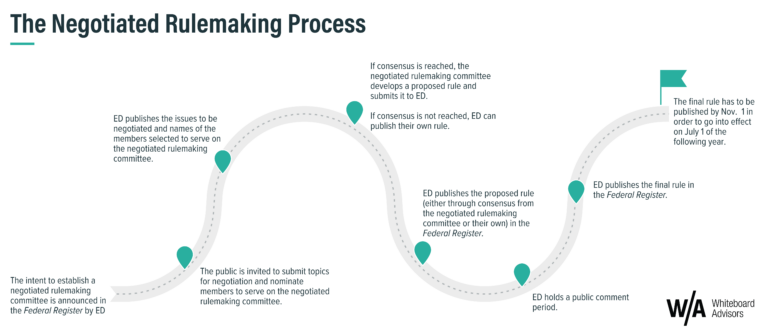For 14 years, Complete College America (CCA) has sought to create a national coalition of states focused on the promise of postsecondary education. Under the leadership of Dr. Yolanda Watson-Spiva, CCA has secured commitments from 50 states, systems, and higher education consortia to put college completion at the center of their state strategic plan for postsecondary education. Whiteboard Advisors’ Alison Griffin sat down with Dr. Watson-Spiva, president of CCA, to learn more.
Alison: Tell me about Complete College America and how the organization approaches its work.
Yolanda: Complete College America is a movement. We believe that every learner can earn a degree or credential if the systems and structures are in place to empower them and remove barriers. CCA is creating a nationwide coalition of states, systems, structures, and partners committed to restoring the promise of higher education.
We take a three-part approach, pushing for changes in policy, perspective, and practice to produce more equitable outcomes for students. We do this work by capturing research and insights to study and promote best practices, advancing issue advocacy to expand support for data-backed solutions, and strengthening our movement through partnerships across the nation.
Alison: What a powerful and timely mission! Tell me more about what drew you to CCA in the first place.
Yolanda: The fearless approach of CCA is what really drew me to the organization. I have spent 25 years working in the postsecondary attainment space and have seen many movements start and stop—but CCA has found what works and seized on it.
CCA is an organization that has long been known for both its research and its advocacy—because they are most valuable when paired together. But CCA is also relentlessly dedicated to eliminating inequities in postsecondary education—promoting equity in higher education strengthens our institutions, economy, and society, and CCA weaves equitable, effective policy, perspective, and practice into everything we do.
Alison: How is the Complete College America mission realized in states and institutions of higher education? Given my focus and interest in the state of Colorado, can you talk about the way the CCA mission is being enacted in the Centennial State?
Yolanda: Complete College America has built a nationwide network of states, systems, consortia, and campuses, so when one member of our Alliance succeeds, it has a ripple effect because we can quickly share data and proven best practices. The CCA Alliance currently has 50 members, including Colorado, and we regularly bring together leaders from the entire Alliance to connect and share their strategies.
Corequisite support is one of the best examples of how CCA has helped to sell and spread an effective strategy. With corequisite support, students take developmental courses alongside credit-bearing courses in the same subject, rather than the traditional model of taking a non-credit-bearing course before being able to take a credit-bearing course. The latter requires students to spend valuable time and financial resources on a non-credit-bearing course.
This tactic started at just a handful of institutions but met a huge need: creating an inclusive way to give students the tools and instruction they need to stay on top of course curriculum, but without penalizing them on the road to completion. We have been able to scale corequisite support and make it more widespread.
Another great example is the alignment of academic and career standards. Colorado has committed to programs that make seamless transitions from high school to postsecondary to workforce programs, aligning with the standards to earn a credential and the skills needed by employers.
Colorado is an example of a state that has truly committed to effective college completion strategies and policies that are equitable and inclusive of all students. For example, the state legislature made corequisite support the default for nearly all students needing remediation, and campuses across the state have scaled successful implementation of this beneficial and equitable support model. Colorado’s higher education and K-12 systems have worked closely to align standards, assessments, and workforce readiness from kindergarten through college graduation.
Colorado is a state we often look to as a model for doubling down on college attainment and educational opportunity.
Alison: What are the policy and practice tools Complete College America has leveraged to effectively “reverse” the paradox around degree completion seen in some states where degree completion is high but significant equity gaps exist?
Yolanda: Equity in access and completion is at the core of CCA’s mission; attainment without equity is not only a moral and social justice issue, but it also hinders the ability of states to meet their workforce and economic goals. At CCA, every one of our strategies takes equity into account because our work can only be successful if we do it through this lens.
Late last year, we released Beyond Good Intentions, a report that laid out policy recommendations to focus on equitable outcomes for college completion.
The first step is to examine data to set equitable completion goals. Colorado has done this: the state set a goal to not only raise its postsecondary completion rate to 66 percent statewide, but also to raise the completion rate for every racial and ethnic student group. Colorado has committed to implementing interventions that can close institutional performance gaps and open the doors of postsecondary education wider for all students. For example, the state has created in-state tuition for all graduates of high schools in the state, a policy that makes college much more accessible for undocumented students. The state also offers in-state tuition to all Native American students, regardless of where they live in the country.
Deliberate, research-backed completion policies and practices that put equity at the core are the best tools to create educational and economic opportunity for everyone, not just some.
Alison: Your annual convening is coming up this winter in Las Vegas, December 10-12. What are the big themes that you expect to focus on, and who should attend this conference?
Yolanda: The theme for CCA’s 2023 Annual Convening is Future Ready, and we are looking forward to the conversations that will dominate the college completion landscape in the next decade, and beyond. We will talk about the issues on the minds of policymakers, practitioners, system and campus leaders, and postsecondary students, from how we address college affordability at a systemic level to the possibilities and challenges of AI in the student success space.
What sets apart the Annual Convening for me is the opportunity for state teams to connect at the event. They can strategize together—in person—in a way they don’t have a chance to do in many other circumstances. State teams can connect alongside other states that may be experiencing the same challenges or seeing success in different ways. After every Annual Convening, I hear from so many people who tell me what an invigorating set of days it was for them. Ideas collide and innovation connects to practice when we have such a large gathering of professionals and students from across the country, from institutions, systems, organizations, state governments and more. The Annual Convening is where research, data and student experiences are transformed into strategies for change. I hope you will join us!




